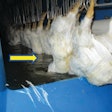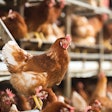Delmarva Poultry Industry, Inc. (DPI) and The Keith Campbell Foundation for the Environment are partnering on a first-of-its-kind project to monitor ambient air quality, including levels of ammonia and particulate matter, on Maryland's Eastern Shore and in central Maryland. Working with the Maryland Department of the Environment, DPI and the Campbell Foundation have jointly committed more than $500,000 to this effort. Because of it, residents of Maryland's Eastern Shore will know more about the quality of the air we all breathe.
Why is DPI doing this? Chicken growers and chicken companies take seriously our responsibility to be responsible stewards of the air, water and land around us. Farm families raising chickens care deeply about air quality on and near their farms; after all, farmers and their neighbors all breathe the same air. Advances in chicken nutrition, the composition of litter in chicken houses, and the increased use of vegetative environmental buffers on family farms where chickens are raised have all made farmers better neighbors when it comes to how their farms affect the air. This monitoring will add to what we know about ambient air quality in the areas of Maryland where chickens are raised.
"We in the chicken community have a shared interest with all Marylanders in better understanding what air quality is truly like on the Eastern Shore," said Holly Porter, DPI's executive director. "Because we will never neglect our commitment to environmental responsibility, we believe gathering more data about air quality here helps everyone."
"This is a new kind of collaboration between government, industry and philanthropy that I hope ultimately will improve the health of families and our environment in the region," said Samantha Campbell, president of the Campbell Foundation.
DPI and the Campbell Foundation are providing most of the funding for this new effort. The data measuring continuous ammonia, fine particulate matter and coarse particulate matter from two new ambient air monitoring stations on the Eastern Shore will be collected and tabulated by the Maryland Department of the Environment, not by the chicken industry. In addition to installing and operating two new stations, this partnership will support retrofitting two existing MDE air monitoring stations – one of them in central Maryland – to monitor continuous ammonia, fine particulates and coarse particulates.
"We firmly believe the air our farmers and their neighbors breathe is healthy and safe, but we also understand why there's skepticism about that from beyond the chicken community," said Holly Porter, DPI's executive director. "Instead of simply asking for the public's trust that the chicken community's best practices are doing what's right for the environment, we want our families, friends and neighbors to be able to see for themselves what ammonia and particulate matter levels are on the Eastern Shore."


















